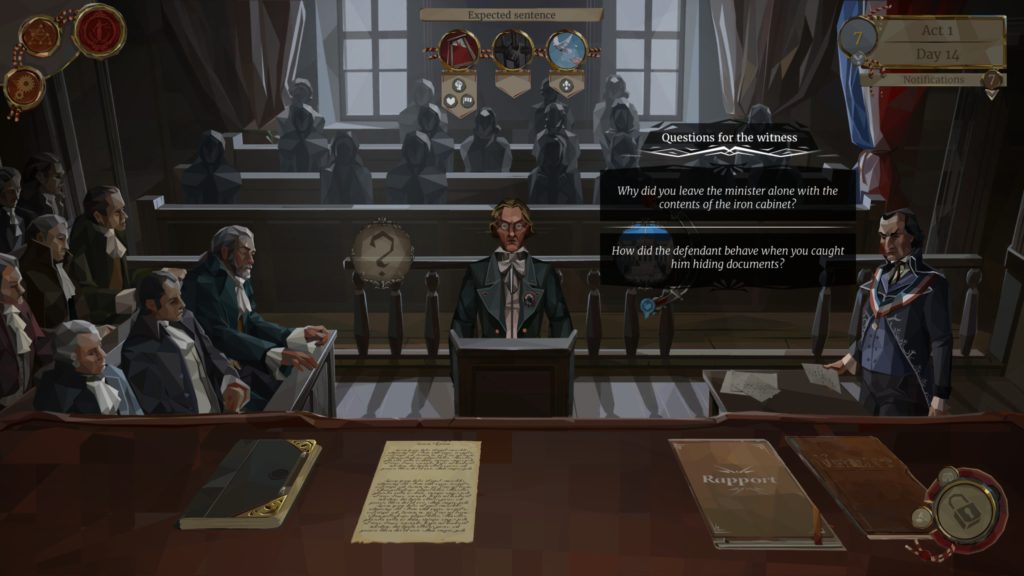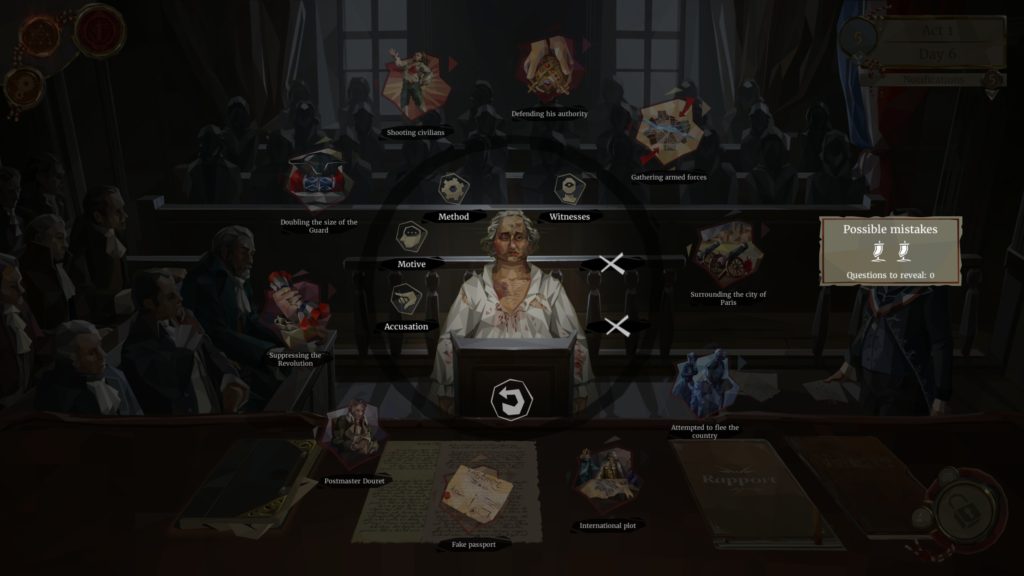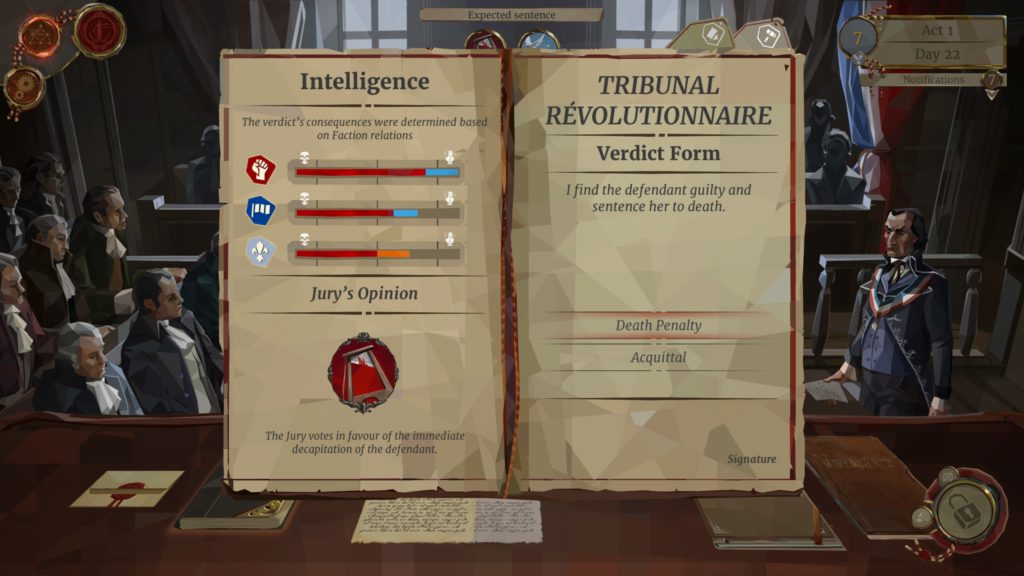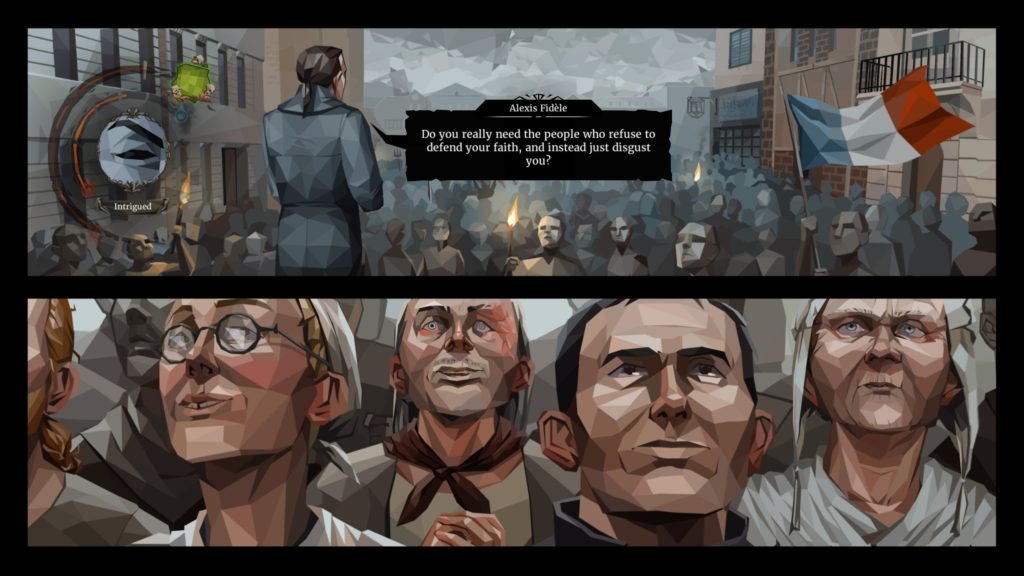
This is an indie game about the French Revolution made by Polish developers. I really wanted to like it due to the originality of its premise but ultimately have to give it a thumbs down because it has too many issues which are inherent in its design. Its story mode is also very frustrating in that you really have no control at all over what happens even if it appears at first that you do. I do credit this for being a worthwhile educational experience about day to day life during the Reign of Terror period of the French Revolution but you have to do your reading up of the facts separately. Even so I’m not sure that the game is worth your time.
You play as Alexis Fidèle, a judge of the Revolutionary Tribunal and your job is to preside and try the cases brought before your court. You’re supposed to read the case file, use the information to formulate the correct questions to ask the defendant and decide if the person is guilty or not. But beware as there are various factions active in Paris and your decisions determine how much they like you. If a faction hates you enough they can remove you or have you killed. Though you can decide cases as you wish, there is a jury and if you consistently go against the wishes of the jury, your reputation will suffer. But you can manipulate the opinions of the jury by choosing which particular questions to ask in court. Finally there is also questionnaire of sorts to fill out in which you and the prosecutor have to decide on the facts of the case. As you can probably tell by now, managing your reputation is a huge part of the game and even how much each member of your family likes you matters. After your day at the court, you can choose how to spend your evenings which helps shapes their opinions.

Fidèle and his family members are fictional characters but you run into plenty of historical characters in this game. It’s not much of a spoiler to say that the fate of even Louis XVI is in your hands. While the court is the meatiest part of the game, there are plenty of other game mechanics too. There’s a persuasion mini-game when you try to get others to see things your way, or to fire up the crowd just before the guillotine goes chop-chop, later the map of Paris opens up and you can direct agents to influence sway different sections of the city to support you and the final part of the game turns into a simple wargame as you fight to control the city, with turn-based combat even and different unit types. There are a lot of moving pieces in this game, too many in fact, and it’s hard to understand the rules for all this and how they interact with one another. During intrigues for example, you can choose which approach to take during key events and this influences the success rate of your action. But you are only the shown the chance of success after you pick an option and you have no idea how this is calculated, so why even have this be gameplay instead of just part of the narrative?
Eventually you realize the dirty truth under all the game mechanics. In the end, something either changes one of your reputation meters or it doesn’t matter at all. Even the opinions of your family members only matter inasmuch as they feed into the other reputation meters and these only matter inasmuch as you can’t allow them to fall too low or risk an instant game over. Otherwise it doesn’t matter how much you make your wife like as she will hate you anyway when the story calls for it. Even your reputation with the aristocrats faction is maxed out, they’ll still come and warn you for working against their interests. Similarly events play out the same whether you win or lose the persuasion mini-game. It just affects your reputation and determines if you get extra influence points, which is a resource used for several things including being better at the persuasion mini-game. At one point in the story, the game even goes all meta by having a mysterious character appear and point out that you have no control over anything at all even if you think you do.

Questionable mechanics aside, the game does get plenty of things right. It gets the atmosphere and the day-to-day horror of life during the Reign of Terror down pat in my opinion. Early on you can choose where the defendant should be acquitted, imprisoned or guillotined. Imprisonment is actually a rather solid compromise between the opposing factions. But soon enough Robespierre will come along and say it’s taking too long and take away the imprisonment option. Oops, suddenly you have to decide if a mere shoplifter deserves having his head chopped off. You can expect to see things get much worse than that as colleagues, allies and friends appear in the dock before you. By the end, any semblance of this being about justice is gone or that the facts of the case matter at all. It’s all about playing the different factions off one another so that you yourself survive another day.
If the game could have been content with that, this would have been fine. It would be a strong theme to build on. But the story goes further than that. Alexis Fidèle is, without a doubt, a protagonist who is utterly evil. Fidèle doesn’t just want to survive, he wants to reach the top of the food chain and he’s willing to lie, kill and betray allies to do so. The player has no say in this at all. It’s nauseating but it is what it is. Furthermore eventually the struggle over control of Paris becomes entwined with Fidèle’s family drama involving entirely fictional characters. I think I see why the developers felt they had to do this. Robespierre is the obvious big bad who represented the Terror but as everyone knows, he eventually falls victim to the monster he created. After that happens in the game, we still need a villain so in come the fictional characters. I maintain that this is a mistake, subsuming the horror of the Terror as part of the squabbles of a fictional family, when the historical events should be allowed to take precedence.

This game reminds me a great deal of Papers, Please, another great indie game that shares some similar themes. But where Papers, Please had a single great core mechanic that nicely encapsulated what it was going for, the court mechanics in this game are weak and shallow. Linking together questions for the defendant feels too abstract compared to what we expect a real judge in a court to do. So they compensated by adding more different things to do, all of which are just as shallow. Why would a judge be involved in organizing the defense of Paris anyway? Your family then becomes upset at you because you’re needed to defend Paris instead of spending evenings with them. How does that even make sense? Then they bulked out the story by making it all about Fidèle’s family and that is just all wrong, wrong, wrong.
I’d also argue that the game does too poor a job at explaining who you are, what you want and who everyone else is. You get some blurbs describing your family members and key allies, but the game still expects you to understand who the Jacobins and Girondins were on your own. It would be best to play this alongside some reading material explaining who people like Jean-Paul Marat were or even who the French Army were fighting at the time. The game seems to assume that you know these things because the storytelling sequences are mainly concerned about Fidèle’s doings. All in all, I had rather high hopes for this game but this has been mainly a huge disappointment. The best I can say that it inspired me to do expand my own knowledge of the French Revolution but this is not a good game at all.